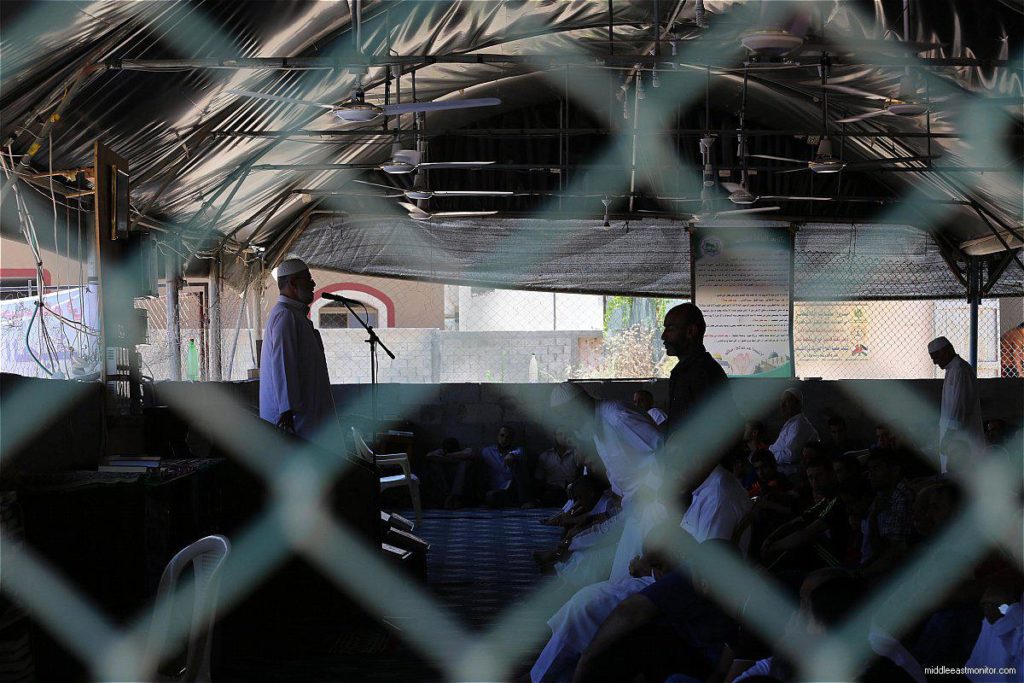Why Is Israel Tightening the Gaza Blockade?
PALESTINE - ISRAEL, 31 Oct 2016
Ben White - Middle East Monitor
 21 Oct 2016 – Let us begin with the facts: Israeli authorities have, over the course of the last year, tightened the long-standing blockade of the Gaza Strip.
21 Oct 2016 – Let us begin with the facts: Israeli authorities have, over the course of the last year, tightened the long-standing blockade of the Gaza Strip.
Even before these more recent restrictions, the Israeli blockade – an illegal policy of collective punishment in the words of United Nations Secretary-General Ban Ki-moon – was continuing to severely harm the lives of Gaza’s two million residents, furthering the enclave’s de-development.
In April of this year, the UN was clear that the most urgent step required for the reconstruction of Gaza remained “the removal of [Israeli] restrictions on the import of building materials, towards a full lifting of the blockade.” Instead, things have gone backwards.
In July, Israeli newspaper Haaretz reported how “restrictions have been tightened on Palestinians seeking to depart the Gaza Strip and on imports permitted into the territory”, including a prohibition on “certain businessmen from importing their merchandise into Gaza.”
UN data confirmed that the blockade tightened in July, while in August, just 110 truckloads of goods exited Gaza, less than half of January’s figure (and 14 per cent of 2005 levels). August also saw a seven-year low in the Israeli approval rate of patient permit applications to leave Gaza for treatment.
Then in September, Israeli NGO Gisha published statistics showing that “1,211 Gazans were summoned to the Erez border crossing for Israeli security interrogations during the first half of the year” – around 2.5 times the number of people interrogated during the same period a year earlier.

Due to lack of building materials being allowed into the Gaza Strip, there has been little progress in the reconstruction of Gaza. The photo shows Palestinians having to pray in a heavily damaged mosque.
In early October, a senior official at the Gaza Chamber of Commerce and Industry described the current situation as “the worst ever”. On 13 October, UN official Nickolay Mladenov warned those “who believe that it’s possible to punish the Gaza Strip and keep it under blockade.”
Meanwhile, however, Israeli Defence Minister Avigdor Lieberman instructed the Israeli military to tighten the blockade, particularly with regards to so-called restricted “dual-use items”. According to Gisha, this list “includes items whose use is overwhelmingly civilian and critical for civilian life.”
In addition to the above, a senior UN official recently described how “conditions have become much more difficult” for the “humanitarian community.” In January, three per cent of requests for permits to enter Israel from Gaza were denied to its Palestinian employees; in August, this had risen to 65 per cent.
His words were echoed this week by UNRWA’s director of operations in Gaza, Bo Schack, who also wrote an op-ed urging an end to the blockade. Speaking to me by phone, Schack confirmed that Israeli restrictions on the entry of cement are delaying the pace of reconstruction.
According to Schack, 400 families whose homes are yet to be rebuilt are still pending approval (as part of the Gaza Reconstruction Mechanism). Furthermore, for the last six months, since May of this year, “we have not received any clearance for any of the cases we’ve submitted”, Schack said.
The Gaza-based UN official also affirmed that, along with “increasing restrictions on Palestinians in Gaza”, there are also “increasing restrictions for movement of staff from the UN – to a much, much larger extent than there was before.”
To Gaza’s traders and humanitarian workers we can now add senior Palestinian Authority officials, with the recent news that the Shin Bet rescinded the permanent exit permits for 12 out of 14 individuals responsible for mediating between Palestinian civilians and the Israeli authorities. In other words, the officials in charge of securing exit permits lost their exit permits.
A number of observers have insisted that Israel has no desire to initiate a new offensive on the Gaza Strip anytime soon, and that Lieberman has – if not changed his stripes – moderated his previous bellicosity and vows to topple the Hamas regime in Gaza now that he occupies the defence ministry.
But then what explains the clear crackdown? It’s not as if the consequences of the blockade are a big mystery. Israel’s “security establishment” itself is reportedly concerned about “instability” in Gaza, citing a growing crisis for Hamas, and staggering levels of poverty.
One Palestinian Authority spokesperson believes that Lieberman, in rescinding the 12 officials’ Gaza exit permits, is implementing his stated policy of disconnecting Israeli communication with institutions under Mahmoud Abbas, “and creating direct communication with Palestinian residents”.
Amira Hass, writing this week on the denial of exit permits for Palestinians in Gaza, noted with withering sarcasm how the Shin Bet “wants me to be persuaded that a female banker has turned dangerous and a teen with cancer, who has been treated in Israel since childhood and currently needs a jaw transplant in Haifa, has become dangerous.”
The Shin Bet knows “it’s all nonsense”, wrote Hass. But what’s behind it all? “We don’t need to wait for the archives to be opened to answer our initial question,” she said. “The Shin Bet and those in charge of it are interested in another terrible round of blood-letting – because the Gaza Strip isn’t obeying its orders and insists on remaining part of Palestinian society and geography.”
____________________________________
Ben White is a British journalist and activist who primarily writes about the Israel-Palestine conflict.
This work is licensed under a Creative Commons Attribution-NonCommercial-ShareAlike 4.0 International License. If the image(s) bear our credit, this license also applies to them. What does that mean? For permissions beyond the scope of this license, please contact us.
Go to Original – middleeastmonitor.com
Join the BDS-BOYCOTT, DIVESTMENT, SANCTIONS campaign to protest the Israeli barbaric siege of Gaza, illegal occupation of the Palestine nation’s territory, the apartheid wall, its inhuman and degrading treatment of the Palestinian people, and the more than 7,000 Palestinian men, women, elderly and children arbitrarily locked up in Israeli prisons.
DON’T BUY PRODUCTS WHOSE BARCODE STARTS WITH 729, which indicates that it is produced in Israel. DO YOUR PART! MAKE A DIFFERENCE!
7 2 9: BOYCOTT FOR JUSTICE!
DISCLAIMER: The statements, views and opinions expressed in pieces republished here are solely those of the authors and do not necessarily represent those of TMS. In accordance with title 17 U.S.C. section 107, this material is distributed without profit to those who have expressed a prior interest in receiving the included information for research and educational purposes. TMS has no affiliation whatsoever with the originator of this article nor is TMS endorsed or sponsored by the originator. “GO TO ORIGINAL” links are provided as a convenience to our readers and allow for verification of authenticity. However, as originating pages are often updated by their originating host sites, the versions posted may not match the versions our readers view when clicking the “GO TO ORIGINAL” links. This site contains copyrighted material the use of which has not always been specifically authorized by the copyright owner. We are making such material available in our efforts to advance understanding of environmental, political, human rights, economic, democracy, scientific, and social justice issues, etc. We believe this constitutes a ‘fair use’ of any such copyrighted material as provided for in section 107 of the US Copyright Law. In accordance with Title 17 U.S.C. Section 107, the material on this site is distributed without profit to those who have expressed a prior interest in receiving the included information for research and educational purposes. For more information go to: http://www.law.cornell.edu/uscode/17/107.shtml. If you wish to use copyrighted material from this site for purposes of your own that go beyond ‘fair use’, you must obtain permission from the copyright owner.
Read more
Click here to go to the current weekly digest or pick another article:
PALESTINE - ISRAEL: